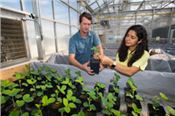Tristan Watson: Managing The Microscopic

Tristan Watson, left, assistant professor and director of the LSU AgCenter Nematode Advisory Service, and Josielle Rezende, AgCenter research associate, examine soybean plants in a greenhouse at the Plant Material Center at the AgCenter Central Research Station in Baton Rouge. These soybeans are part of a project to learn more about how the reniform nematode affects the crop.
Photo by Olivia McClure
OLIVIA MCCLURE
BATON ROUGE, LOUISIANA
Watson, an assistant professor in the LSU AgCenter Department of Plant Pathology and Crop Physiology, is working to help Louisiana farmers identify nematode problems in their fields as well as the best ways to control them. Nematodes are microscopic roundworms that feed on crops’ root systems, causing stunted plants, leaf damage, galls on roots and, ultimately, lower yields.
“Often these nematode infestations go unnoticed for multiple years until they get to the level where we start to see some severe reduction in plant growth, and this is often when the farmer catches that they have a nematode problem in their field,” Watson said.
Infestations can be hard to detect early on because their symptoms mirror those caused by other conditions, such as water stress and nutrient deficiencies. But adjusting irrigation or applying more fertilizer won’t solve the problem. Nematodes cause plants’ roots to become so heavily parasitized that they can’t access water or nutrients.
Management also can be a challenge, Watson said. Multiple strategies usually have to be implemented to bring a nematode infestation under control.
The first step is diagnostics. Farmers who notice problems in their fields can collect soil samples and send them to the AgCenter Nematode Advisory Service lab, where Watson can determine whether nematodes are the culprit – and if so, which species are present and at what population density. He can then recommend a management plan, which may include the use of nematicides, rotation crops and cover crops.
Watson grew up near Calgary, Alberta, Canada. As an undergraduate studying microbiology at the University of British Columbia, he had aspirations of becoming an infectious disease researcher. But a research project in his fourth year at the university exposed him to nematodes for the first time – piquing his interest in the microscopic organisms and their big impact on agriculture.
His curiosity remains strong today. When people ask why he was drawn to studying nematodes, Watson explains that “for me, it’s understanding the unknown.”
Columbia, he had aspirations of becoming an infectious disease researcher. But a research project in his fourth year at the university exposed him to nematodes for the first time – piquing his interest in the microscopic organisms and their big impact on agriculture.
His curiosity remains strong today. When people ask why he was drawn to studying nematodes, Watson explains that “for me, it’s understanding the unknown.”
“We have these microscopic organisms that are down in the soil environment having a severe impact on our crops,” he said, “and we really don’t understand very much about their biology or how to manage them.”
The AgCenter and Louisiana have provided an ideal environment for his research. Growers have been supportive and offered space for Watson to set up on-farm demonstrations.
“Since I’ve been here in Louisiana, I’ve really felt at home,” he said. ∆
OLIVIA MCCLURE: LSU AgCenter